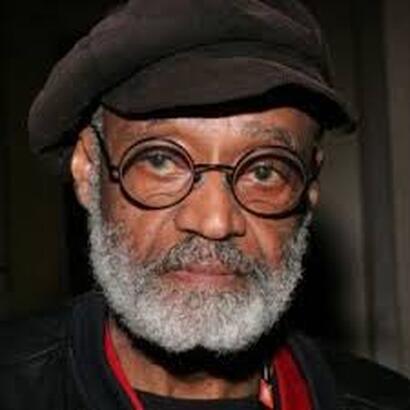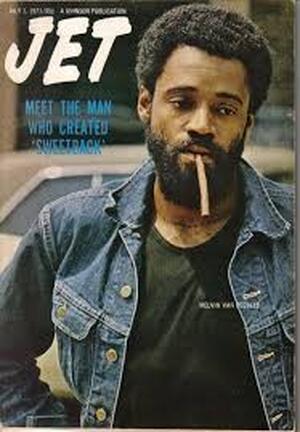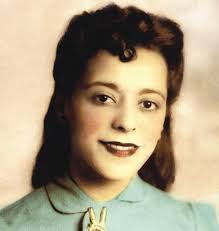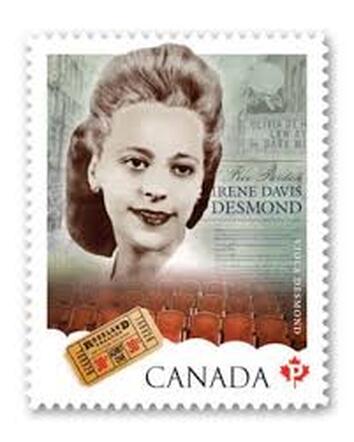|
On August 21, 1932, Melvin Peebles was born to parents Edwin Griffin and Marion Peebles in Chicago, Illinois. Edwin Griffin worked as a tailor in Phoenix, Illinois, the same suburb where Van Peebles attended Thornton Township High School, graduating in 1949. After high school he attended West Virginia State College then transferred to Ohio Wesleyan College, graduating with a degree in English Literature in 1954. Thirteen days after his college graduation Van Peebles joined the Air Force where he served for three and a half years. In 1956, Van Peebles spent time in Mexico, where he married Maria Marx who was a German actress and photographer; the couple produced Van Peebles’ eldest son actor and director Mario Van Peebles. While living in Mexico Van Peebles earned a living as a painter, in 1958 he moved to San Francisco, California where he found work as a cable car grip man. In 1957, Van Peebles made his first short films Sunlight and Three Pickup Men for Herrick as a new filmmaker. With no previous experience in film making and his first two short films in hand, Van Peebles set out to Hollywood to become a film director. Unfortunately, his films were not well received and he didn’t find anyone who wanted to work with him. While in New York City, he was offered a chance to screen his films in France, this meeting led to him and his family moving to the Netherlands and Van Peebles working for the Dutch National Theater. While living in the Netherlands Melvin Peebles changed his name to Melvin Van Peebles, to help him find work. Van Peebles was starting to gain recognition for his films; he was invited to work in Paris by Henri Langlois a French film archivist and influential film figure. Langlois hired Van Peebles to translate Mad Magazine into French, to do so, Van Peebles learned French and began to change the course of his career and film history. Van Peebles began writing plays using a French style of songwriting that mixed singing and speaking. Van Peebles began writing novels in the 1960s; his first four novels were The Big Heart, A Bear for the F.B.I., The True American, and Harlem Party. He also wrote a collection of short stories in French before releasing his French short film Cinq Cent Balles in 1965. In 1968, Van Peebles made his first feature-length film titled The Story of a Three-Day Pass, which was successful enough to attract Hollywood producers; because of his name being Van Peebles the Hollywood producers thought he was a white man. In 1968, Van Peebles also released his first studio album as a recording artist titled Brer Soul. The success of The Story of a Three-Day Pass led to Van Peebles being selected by Columbia Pictures to direct the film The Watermelon Man in 1970. Van Peebles was also selected to direct the filming of the Powder Ridge Rock Festival before it was canceled by a court injunction. In 1971, Melvin Van Peebles rocked Hollywood and the black film industry when he made his groundbreaking film Sweet Sweetback's Baadasssss Song. Van Peebles along with a fifty-thousand dollar loan from Bill Cosby funded the film. Van Peebles wrote the script, directed the film, edited the film, wrote the score for the film, and he also developed and directed the marketing campaign for the film. It is considered a groundbreaking film because it created the “Blaxploitation” era in film, its message resonated with the Black Panthers and other groups fighting for black liberation, it grossed over ten million dollars, and showcased the brilliance of Melvin Van Peebles to the world. In 1972, Van Peebles wrote the composition for the theater adaptation of his novel Harlem Party titled “Don’t Pay Us Cheap”, his work on the music and the book led to Van Peebles being nominated for two Tony awards. Van Peebles was also nominated for a Tony award as a composer and lyricist for the play “Ain’t Supposed to Die a Natural Death.” In 1976, Van Peebles wrote the theme song for the television series "Just an Old Sweet Song", in 1977, he wrote the screenplay for the biopic "Greased Lightning", in 1978, he wrote the pilot for the television show “Down Home”, before making his television debut as an actor in the 1981 series “The Sophisticated Gents”. Van Peebles began working in the American Stock Exchange as an options trader in the 1980’s, where he would ultimately find success. In 1986, he wrote the book Bold Money: A New Way to Play the Options Market, and in 1987 he opened Van Peebles and Hayes Municipal Securities, which was a municipal bonds firm. In 1995, Van Peebles co-starred in the live-action version of the Japanese comic Fist of the North Star, in 2005, Van Peebles was the focus of the documentary How to Eat Your Watermelon in White Company, later in 2005, Van Peebles along with Ossie Davis and Gordon Parks were featured in the documentary Unstoppable. As a professional creator Melvin Van Peebles wrote thirteen books; directed, wrote, scored or produced over 13 films; earned ten extra writing credits working on films in various capacities; has 16 credits as an actor; wrote six plays; released seven studio albums; and four movie soundtrack albums. Van Peebles was truly a man that refused to be held back by the racism in America. He earned a chance to make films in Europe but ended up changing the film industry in America and around the world. He helped Hollywood and the rest of the world see that black people could write, direct, act, produce films, create the music, and even perform the music. He made his first two short-films not understanding how to make a movie, but in the end, he fully understood that he must take control of his career to truly make a difference in the film. Mr. Melvin Van Peebles, we proudly stand on your shoulders. J. A. Ward Click here to learn more about the On the Shoulders of Giants book series!!! References:
https://www.britannica.com/biography/Melvin-Van-Peebles https://aaregistry.org/story/melvin-van-peebles-born/ https://www.blackpast.org/african-american-history/van-peebles-melvin-1932/ -https://en.wikipedia.org/wiki/Melvin_Van_Peebles
1 Comment
On July 6, 1914, Viola Irene Davis was born in Halifax, Nova Scotia, as one of ten children to parents James Albert and Gwendolin Irene Davis. James was a barber and Gwendolin was a homemaker; Gwendolin was seen as an uncommon woman, she was a white woman who made a family with a black man and she was active in fighting for black rights. As a young girl Viola wanted to be a hairdresser, she also noticed a need for black hair care and beauty products in Nova Scotia. Racism in Canada was prevalent and would deny Viola her human right to attend beauty schools in Halifax, Nova Scotia. Determined to get the training she needed, she moved to Montreal to attend the Field Beauty Culture School, before attending beauty school in Atlantic City, New Jersey, and New York City; in New York, she was able to develop her skills attending one of Madame C.J. Walker's beauty schools. She would complete her training and earned her diploma from the Apex College of Beauty Culture and Hairdressing in Atlantic City, New Jersey. After completing her beautician training, Viola returned to Halifax where she opened her own beauty salon in 1937 to served black clients. Her salon was very popular and even attracted notable black Canadian women such as opera singer Portia White and Nova Scotia’s first black nurse Gwen Jenkins. Returning to Halifax also afforded Viola the chance to meet and Mary a man named Jack Desmond, who was integral in helping her become a successful businesswoman. Viola drew from her own experience as an aspiring beautician, she remembered the discrimination she faced and didn’t want any other black women to face discrimination, so the Desmond School of Beauty and Culture was created to serve and educate the future of black women beauticians. Viola Desmond was truly standing on the shoulders of black hair care pioneers Annie Malone and Madame C.J. Walker. Annually the Desmond School of Beauty and Culture would graduate up to fifteen women fully equipped as master beauticians and business women. Black women from all over Canada and parts of the United States attended Viola's school. Black women who were rejected by white-run beautician schools found a place at the Desmond School of Beauty and Culture. Entrepreneurship was in Viola's blood and professional training, so it was no surprise that she created her own line of beauty products, VI’s Beauty Products. Later in her entrepreneurial journey, Viola and her husband Jack joined forces and opened a beauty and barber salon to serve the black men and women of Halifax. Viola Desmond became a notable woman within the communities of Halifax, but her success would not shield her from the ongoing racism experienced in Canada. In 1946, Viola took a business trip to New Glasgow, Nova Scotia to sell her beauty products. She was experiencing car trouble and took her car to be repaired, informed that it would take a day to fix her car she decided to see the movie “The Dark Mirror” at the Roseland Theater. Unaware that the theater was segregated she proceeded to sit on the main floor instead of the balcony that was reserved for black patrons. Viola was said to be nearsighted and sat in the main floor section so she can see; she was also sold a ticket designated for the balcony; tickets for black moviegoers were taxed higher than tickets for white moviegoers. The manager of the theater quickly demanded that Viola leave the main floor and sit in the balcony. She refused to move because she could actually see the screen from her main floor seat. The theater called the police and Viola was removed from the main floor by physical force and injured in the process. For her refusal to leave the “white section” she was arrested and charged with tax evasion; it was a one cent difference in tax between black and white movie tickets. Viola was forced to pay a twenty dollar fine along with six dollars in court fees to be released from jail. After her release from jail, Viola and her husband discussed her arrest, he attempted to encourage her to drop the matter and move on with her life, encouraged by her minister she followed her heart and took the case to court to claim her justice. Black Canadian journalist Carrie Best wrote about Viola’s case in The Clariton which was a black-owned Canadian newspaper. The story running in the newspaper helped the case to gain momentum and support; the Nova Scotia Association for the Advancement of Colored People (NSAACP) learned of her case and decided to help her fight the case. Viola was able to hire Frederick William Bissett as her lawyer but was unsuccessful in filing a lawsuit against the theatre. Tax evasion was the crime that the Canadian government was set on charging Viola Desmond with, even though Viola tried to buy a main floor ticket, but they were not sold to black patrons. The language of the Nova Scotian statues did not help Frederick Bissett’s argument against tax evasion; many people believed that he failed her as a lawyer for trying to argue the tax evasion angle instead of the angle of racial discrimination. Even though Bissett was unsuccessful in his defense of Viola Desmond he did not charge her for his services, the money he would have charged her was used to support the Nova Scotia Association for the Advancement of Colored People (NSAACP), which was in its infancy stage. Following her loss in her trial, she closed her business and moved to Montreal, Canada and enrolled into Business College. Later she would settle in New York City before she died of gastrointestinal hemorrhage in 1965. In 2010, Viola was pardoned posthumously by the Lieutenant Governor of Nova Scotia for her wrongful arrest and conviction in the movie theatre. Though Viola Desmond was no longer with us physically her legacy was set; a scholarship was created in her name at Cape Breton University. In 2012, her likeness was displayed on a commemorative Canadian stamp. In 2016, a Halifax Harbor ferry was named and her name was included in her honor. In December of 2016, her likeness was chosen to appear on the Canadian ten-dollar note. In January of 2018 she was named a National Historic Person, and June of 2018 she was given a star on Canada’s Walk of Fame. She was an outside-the-box thinker and black Canadian pioneer, she was not afraid to face Canada's racist systems even if it was not a planned event. She created the black hair care industry in Canada while creating opportunities for other black people to succeed. Mrs. Viola Irene Desmond, we proudly stand on your shoulders. J.A. Ward Click here to support our On the Shoulders of Giants African history book series!! |
Details
Categories
All
Click Here to join our mailing list
|
Contact Us: |
Connect With Us |
Site powered by PIT Web Design





 RSS Feed
RSS Feed



